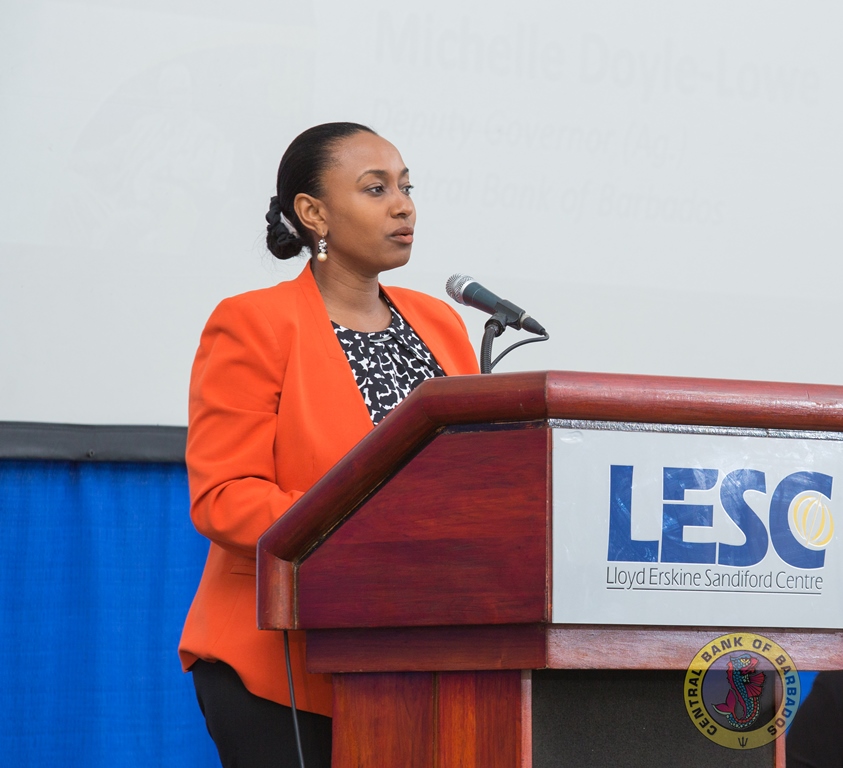
It is my pleasure to welcome you this morning to the 9th Domestic Financial Institutions Conference, jointly hosted by the Central Bank of Barbados and the Financial Services Commission (FSC). Firstly, let me extend an apology on behalf of Governor Haynes, who is unable to join us this morning but sends his well wishes for a productive and stimulating discussion.
The Bank’s on-going collaboration with the FSC in organising this event reflects our joint belief that, as our nation’s financial sector regulators, it is imperative that we provide fora of this nature to enable practitioners at our licensed financial institutions to engage with us in forthright and

constructive discussions about the issues that affect our day to day operations. This is a forum which, if used effectively, can provide an opportunity for us as regulators to enhance our messaging and to refine our policymaking. In addition, by sharing our varied perspectives and new thinking, we are better able to keep abreast of cutting edge developments in financial services. The need for this interaction between the regulator and the regulated is especially important at this time, when the financial sector and the broader economy face difficult challenges ahead.
Since our last conference, there have been several developments that have had or will have a significant impact on the financial system. First, the economy has suffered a further loss of international reserves that requires a tightening of fiscal policy and a compression of domestic demand. Secondly, commercial banks have been asked to increase their holdings of government securities from 10% to 20% of their domestic deposits. Thirdly, insurance companies with regional cross-border operations have been confronted by significant claims in the aftermath of the severe hurricanes. Fourthly, the accounting standard for provisioning against impaired loans changed as of the beginning of this year and, fifthly the Government recently announced the suspension of external debt payments and the intent to restructure domestic debt – so quite a bit to manage indeed!
In particular, the impact of the new provisioning rules and the debt restructuring are uncertain, with the potential to compress the income of financial institutions. The on-going macroeconomic challenges require durable solutions for the public finances and the reduction of the debt burden. We are certainly mindful that these must be achieved while containing the impact on financial institutions, which have a fiduciary responsibility to depositors and investors and which serve the national interest by transforming savings into loans and other investments, in support of economic activity.
Our agenda today seeks to address some of these emerging issues and developments. We begin with a keynote address by Professor Avinash Persaud who was recently named an economic advisor to the Government of Barbados. Prior to this role, he has been the Special Adviser to the Prime Minister of Dominica, as that island seeks to become the world’s first climate-resilient country. This is an ambitious and highly commendable goal, which is relevant to us in Barbados given our geographical location and size. Avinash will share some of his insights as he addresses the topic “What Does Resiliency Mean and How Do You Build It?”
Today we launch the 2017 Financial Stability Report prepared jointly by the Bank and the FSC. This report

provides an analysis of key financial system variables, assesses system-wide prudential indicators and examines the ability of the financial system to withstand economic shocks. This year’s report highlights that the financial system, though growing slowly, remained stable and is capable of absorbing sectoral shocks. However, there remain potential downside risks to the performance of the financial system. Anton Belgrave, our Acting Director of Research and Economic Analysis at the Bank, will share key findings from the report.
This year’s conference agenda also features two panel discussions. In the first, we will get an update on the 2016 Mutual Evaluation Exercise. In the second, we will explore how emerging industries, such as renewable energy and the cultural industries, which have the potential to advance economic growth, can establish mutually beneficial linkages with the financial sector.
In between the two panel discussions, we will tackle an issue that has proven challenging for many of us in the financial sector: the implementation of IFRS 9.
Finally, we will end with a lunchtime address presented by Paul Ashby, the CEO of Signia Financial, on the topic “Transformational Leadership: Leading from the Core.” At the Week of Excellence held earlier this year, it was noted that to compete in the globalised economy our firms need to enhance their competitiveness. This requires that they innovate by pursuing new ideas and business models. I am eager to hear Paul’s take on how a change in our approach to leadership can aid this evolution.
Other strategic transformations that we must embrace include the enhancement of our payments market infrastructure and deeper facilitation, and use of electronic financial services. This must be supported by the appropriate oversight and a regulatory stance that allows new technologies to be leveraged, while promoting adequate consumer protection, financial soundness, risk management and fair competition. Broadening the Financial Institutions Act and the introduction of payments legislation, present the means to achieve these objectives.
The Government of Barbados has also committed to the dematerialisation of its medium and long-term securities, to ensure efficient and timely issuance and transfers between bond holders. This promise has been in abeyance for some time but the Bank, subject to the availability of drafting resources, will seek to advance this initiative in the coming months.
Ladies and gentlemen, as you can see, even with the abridged schedule, we have quite an agenda, so I will conclude here so that we can begin what promises to be another fruitful Domestic Financial Institutions Conference.